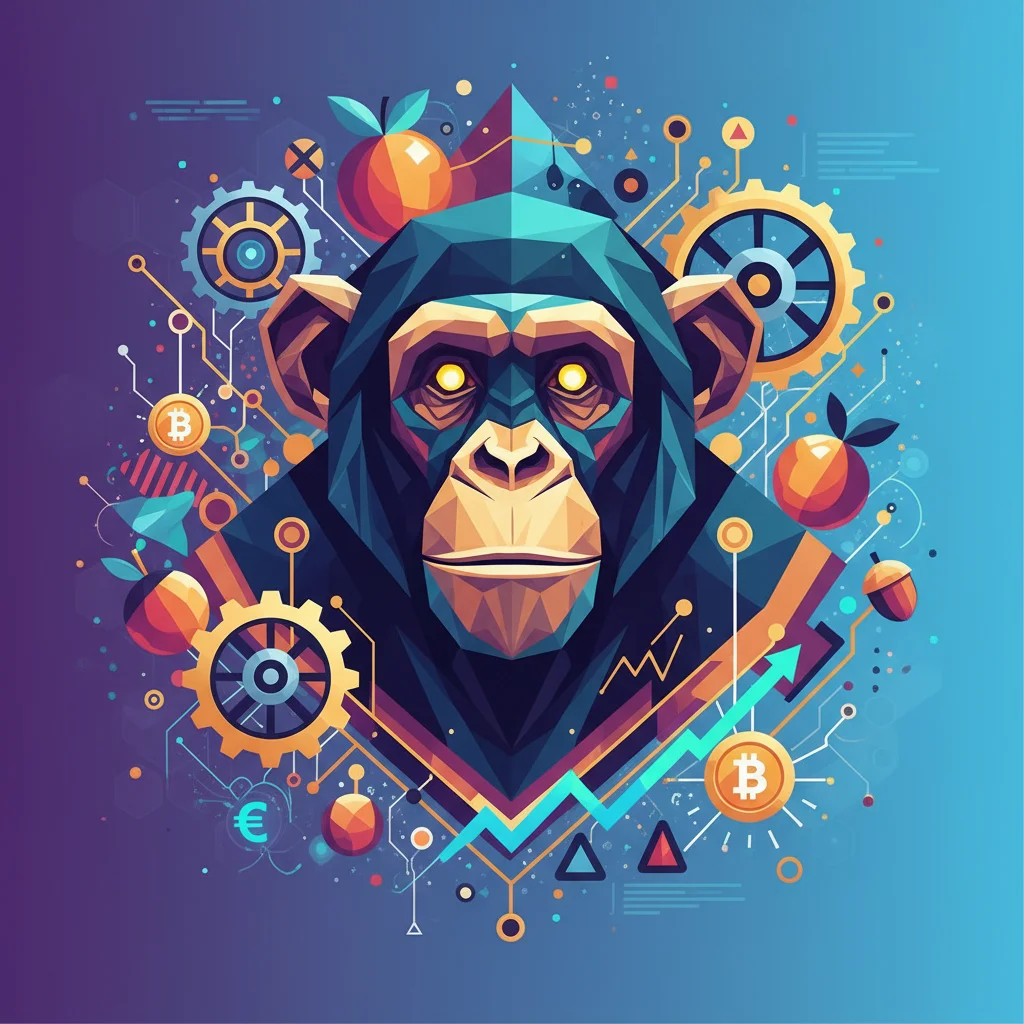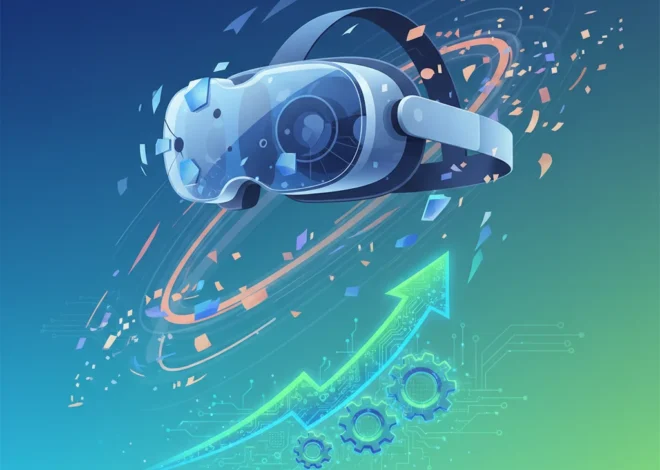
Primal Finance: What Chimpanzee Behavior Teaches Us About Modern Investing
In the hyper-accelerated world of modern finance, where algorithms execute trades in microseconds and market sentiment shifts with a single tweet, we often look to complex data models and bleeding-edge financial technology for an edge. We analyze charts, build sophisticated economic forecasts, and leverage AI to predict the next market move. But what if the most profound lesson for navigating today’s volatile economy doesn’t come from a supercomputer, but from our closest living relatives in the animal kingdom?
A recent letter to the Financial Times by Avinashiappan Myilsami presented a fascinating observation about chimpanzee behavior. When a troop of chimps senses a predator, like a leopard, they don’t scatter in a blind panic. Instead, they exhibit a remarkable, coordinated strategy. A single, brave chimp will climb a tree to assess the threat, pinpointing the leopard’s location and observing its movements. The rest of the troop waits, alert and silent, for the scout’s signal. Only after this careful intelligence-gathering does the group act in a unified, strategic manner.
This behavior stands in stark contrast to the human “fight-or-flight” instinct that so often governs the stock market. When the “leopard” of a market downturn appears, the human herd tends to panic. The result is a stampede of sell-offs, driven by fear rather than fact. This raises a critical question for everyone from the retail investor to the institutional fund manager: in our pursuit of sophisticated financial tools, have we forgotten the simple, primal wisdom of calculated patience?
The Human Herd vs. The Chimpanzee Troop
The field of behavioral economics has long studied the psychological biases that lead investors astray. One of the most powerful is herd mentality, the tendency for individuals to follow the actions of a larger group, whether those actions are rational or not. During the 2008 financial crisis, this instinct was on full display as fear spread like wildfire, causing investors to dump assets at rock-bottom prices. Research has shown that such panic selling often leads to significant losses, as investors who sell during a downturn frequently miss the subsequent recovery. For instance, a DALBAR study consistently finds that the average investor’s returns lag significantly behind market indices, largely due to emotionally driven trading decisions like panic selling and chasing returns.
This is where the chimpanzee model offers a powerful alternative framework. Their strategy is not one of passive inaction, but of *active, disciplined observation*. It’s a masterclass in risk management:
- Isolate the Scout: One individual is tasked with gathering clear, unbiased information.
- Maintain Group Discipline: The rest of the troop resists the urge to act on incomplete information, trusting the process.
- Act on Intelligence: The group’s collective action is based on the scout’s specific findings, not on generalized fear.
In the world of investing, the “scout” can be your own research, a trusted financial advisor, or a well-defined set of analytical principles. The key is to separate the signal from the noise. The 24/7 news cycle, social media chatter, and constant stock market ticker updates are the jungle drums beating a rhythm of panic. The chimpanzee strategy teaches us to silence that noise and focus on the real data—the leopard’s actual location and intent.
Let’s compare these two approaches more directly:
| Behavioral Driver | Human Herd Instinct in Finance | Chimpanzee Troop Strategy |
|---|---|---|
| Threat Perception | General, undefined fear. Responds to market noise, rumors, and headlines. | Specific, targeted assessment. Seeks to identify and understand the exact nature of the threat. |
| Initial Reaction | Immediate, emotional “fight-or-flight” (e.g., panic selling, FOMO buying). | Calculated pause. Deploys a scout for intelligence gathering while the group remains alert. |
| Information Processing | Follows the crowd (social proof), leading to information cascades and amplified volatility. | Relies on a trusted, primary source (the scout). Information is centralized and verified before action. |
| Outcome | Often results in buying high and selling low; suboptimal returns driven by emotion. | Coordinated, strategic action based on clear intelligence, maximizing survival and success. |
The Billion-Dollar Blind Spot: Why the McDonald's Harassment Scandal is a Wake-Up Call for Investors
How Modern Fintech Amplifies Our Worst Instincts
While the human brain has been wired for herd behavior for millennia, modern financial technology has put this instinct on steroids. The rise of fintech and commission-free trading apps has democratized access to the stock market, which is a net positive. However, it has also “gamified” investing, encouraging high-frequency trading and impulsive decision-making. Push notifications about market swings and the social-media-fueled phenomenon of meme stocks tap directly into our primal fear of missing out (FOMO).
The world of blockchain and cryptocurrency trading is perhaps the most potent example of this digital herd mentality. The extreme volatility of the asset class, combined with a community-driven, often-hyped environment, creates perfect conditions for emotionally charged financial decisions. The chimp’s calm, patient assessment is the antithesis of the frantic, 24/7 nature of the crypto economy.
The very design of our modern banking and trading platforms can encourage the wrong kind of behavior. They are built for speed and engagement, not necessarily for thoughtful, long-term wealth creation. The challenge for the financial technology industry is to design platforms that empower users not just to act, but to act wisely—to build tools that serve as the “scout,” not just the “jungle drum.”
Wall Street's Warning Bell: Is the US Financial System's Plumbing About to Clog Again?
Applying the Chimpanzee Model to Your Financial World
The wisdom of the chimpanzee troop is not just a quaint metaphor; it provides a concrete, actionable blueprint for navigating the complexities of the modern economy. Here’s how different stakeholders can apply it:
For Individual Investors:
Your primary task is to be the scout for your own portfolio. This means stepping back from the daily noise and focusing on fundamentals. Before making a move during a market panic, ask yourself: Has the long-term value of my investment fundamentally changed, or am I just reacting to the fear of the herd? A well-diversified portfolio and a clear, long-term investing thesis are your best defense against primal panic. As primatologist Jane Goodall’s research has shown, chimpanzee societies are built on complex social strategies and tool use (source); similarly, your financial success depends on using the right tools (diversification, research) and strategies (patience, discipline).
For Business Leaders and Corporate Strategists:
During an economic downturn, the corporate world often engages in its own form of panic: immediate, widespread layoffs, slashing R&D budgets, and halting all expansion plans. The chimpanzee model suggests a different approach. Instead of reactive cost-cutting, leaders should “send out a scout.” Conduct deep market analysis, talk to your customers, and assess which parts of the business are truly at risk versus which have new opportunities. A recession can be a time to gain market share and build a stronger, leaner organization, but only if decisions are driven by strategic assessment, not by a headline-induced fear spreading through the banking and finance sectors.
For the Fintech and Banking Industry:
The future of financial technology and banking services should be centered on promoting better decision-making. This means designing platforms that provide context, not just data. Imagine a trading app that, during a market crash, shows you historical data on how many downturns have been followed by recoveries, or a banking platform that visualizes how impulsive withdrawals could impact long-term retirement goals. According to a PwC report on Fintech, trust is a cornerstone of the industry’s growth. Building tools that protect customers from their own worst instincts is the ultimate way to build that trust.
Grounded Nation: How Airport Chaos Reveals Deep Fissures in the US Economy
Conclusion: Primal Wisdom for a Digital Age
The financial world will only grow more complex. The speed of information will increase, and new technologies like blockchain and AI will continue to reshape the economic landscape. In this environment, our ancient, hardwired instincts for panic and herd behavior will remain our greatest vulnerability.
The lesson from our primate cousins is timeless. True strength in the face of uncertainty comes not from frantic action, but from disciplined patience. It comes from trusting the scout, silencing the noise, and acting on intelligence rather than impulse. The next time the markets begin to tremble and the digital herd prepares to stampede, remember the chimpanzee. Climb a tree, get a clear view, and wait for the right moment. In finance, as in the jungle, survival often belongs not to the fastest, but to the wisest.


